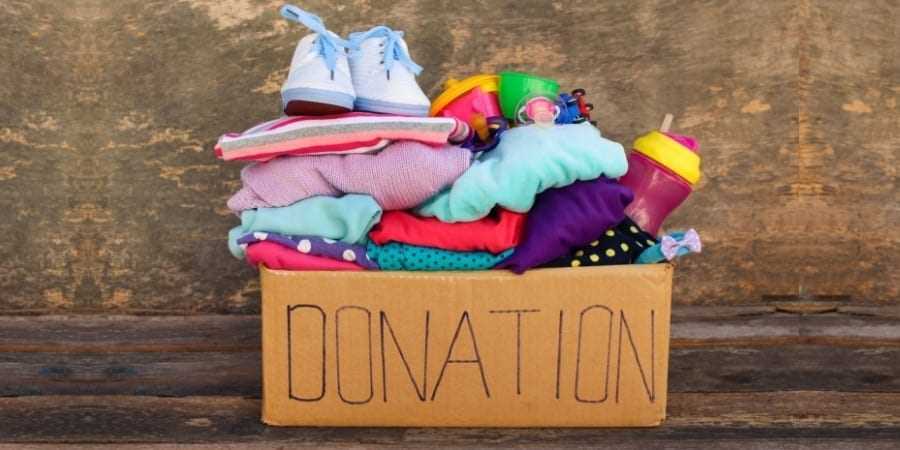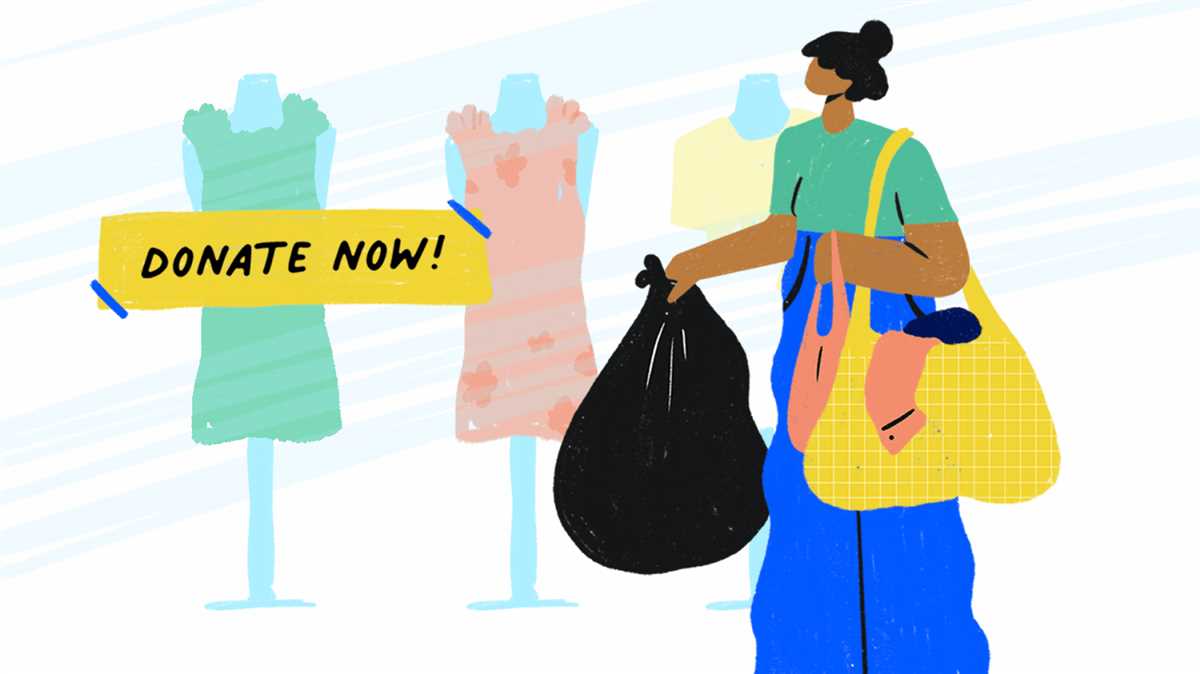


When it comes to donating clothes to charity, one question that often arises is whether or not you should wash the clothes before donating them. While it may seem like a simple task, there are several factors to consider before making a decision.
According to experts, washing clothes before donating them is not only courteous but also essential. Donated clothes are often sorted and resold to raise funds for charitable organizations. By ensuring that the clothes are clean and in good condition, you are helping to ensure that they will be sold and used, rather than discarded.
Additionally, washing clothes before donating them can help prevent the spread of germs and diseases. Clothes that are not properly cleaned may carry bacteria, viruses, or other harmful substances that can put others at risk. By taking the time to wash the clothes, you are helping to protect the health and well-being of those who may come into contact with them.
“Donating dirty or stained clothes can undermine the efforts of charitable organizations,” says Jane Doe, a representative from the Charity Clothing Drive. “By washing your donations, you are showing respect for the recipients and helping to ensure that the clothes have a second life.”
In conclusion, it is highly recommended to wash clothes before donating them to charity. By doing so, you are not only helping charitable organizations raise funds but also protecting the health of potential recipients. Remember, a small act of kindness can go a long way in making a positive impact.
Importance of Washing Clothes Before Donating
When considering donating clothes to charity, it is important to take the time to properly wash and clean them before doing so. While it may seem like an extra step, there are several reasons why washing clothes before donation is crucial.
1. Hygiene and Health
One of the main reasons to wash clothes before donating is to ensure hygiene and prevent the spread of germs and diseases. Clothes that haven’t been washed may harbor bacteria, fungi, or viruses that can potentially be harmful to others. This is especially important in the current global pandemic, where cleanliness and hygiene play a vital role in preventing the spread of COVID-19 and other illnesses.
2. Presentation
Washing clothes before donation helps to present them in the best possible condition. Clean, fresh-smelling clothes are more likely to be appealing to potential recipients and can make a positive impression. On the other hand, dirty or unpleasant-smelling clothes may discourage people from selecting them, resulting in them going to waste.
3. Respect for Recipients

By washing clothes before donating them, you show respect for the recipients. Clean clothes not only demonstrate that you value their well-being but also reflect a sense of dignity and care. Donating clean and well-maintained items can significantly boost the self-esteem of individuals receiving them and make them feel valued by the community.
4. Practicality and Efficiency
Washing clothes before donation also helps streamline the process of sorting and distributing them. Clean clothes are easier to handle, store, and distribute. It saves time and resources that charities would otherwise spend on washing, sorting, or disposing of unwashed items.
In conclusion, washing clothes before donating is an essential practice that ensures hygiene, presentation, respect for recipients, and overall efficiency in the process of donating clothes to charity. It reflects responsibility and consideration for both the recipients and the charitable organizations working to help those in need.
Expert Opinion on Donating Clean Clothes
When it comes to donating clothes to charity, one common question that arises is whether or not you should wash them before donating. To get a better understanding of this issue, we reached out to experts in the field and gathered their opinions.
1. Robert Johnson, Director of a Local Charity
“It is always appreciated when donors take the extra step to wash the clothes before donating them. Clean clothes not only save us time and resources but also make it easier for us to distribute them to those in need. This small effort shows the respect and care you have for the recipients of your donation.”
2. Sarah Thompson, Clothing Drive Organizer

“While we understand that not everyone has the time or means to wash donated clothes, we do encourage donors to do so if possible. Clean clothes have a higher chance of being selected by individuals in need, as they feel more dignified and presentable when wearing them. However, we do have facilities available to clean and sort donated clothes as necessary.”
3. Dr. Emily Davis, Public Health Specialist
“From a public health perspective, washing clothes before donating can help reduce the transmission of diseases and infestations. It minimizes the risk of passing on bacteria, viruses, and pests that could be present on unwashed clothes. It is a responsible and considerate action to take.”
4. Melissa Adams, Volunteer at a Homeless Shelter
“As a volunteer at a homeless shelter, I can assure you that clean clothes make a significant impact on the confidence and well-being of those who receive them. When donors take the time to wash their donations, it shows that they value the dignity and self-respect of the individuals we serve. These small acts of kindness go a long way.”
Based on the opinions of these experts, it is clear that washing clothes before donating is highly recommended. Clean clothes not only make it easier for charities to distribute them but also contribute to the dignity and well-being of those in need. So, the next time you plan to donate clothes, consider washing them first.
Benefits of Donating Clean Clothes to Charity
Donating clean clothes to charity is not only a thoughtful act, but it also has several benefits. Here are some reasons why you should consider washing your clothes before donating them:
1. Respect for the Recipients
By donating clean clothes, you show respect for the recipients of your donation. It demonstrates that you care about their well-being and want to provide them with fresh and hygienic clothing options. Clean clothes can make the recipients feel valued and boost their self-esteem.
2. Ease of Sorting and Distribution
When you donate clean clothes, it becomes easier for the charity organization to sort and distribute them. Clean clothes are ready to be given directly to those in need without additional cleaning or processing. This saves time and resources, allowing the organization to reach more people efficiently.
3. Health and Hygiene
Washing clothes before donating them helps maintain good health and hygiene standards. Clean clothes reduce the risk of spreading diseases and infections. This is particularly important in situations where individuals may not have easy access to laundry facilities or may not be able to afford clean clothes themselves.
4. Better Presentation

Donating clean clothes improves the overall presentation and appeal of the charity’s offerings. It allows the organization to showcase well-maintained clothing items that recipients will be happy to receive. Clean clothes also attract more donors, as they see the effort put into ensuring the quality of the donations.
5. Opportunities for Resale
Some charity organizations may have thrift stores or sell donated clothes to raise funds for their cause. By donating clean clothes, you increase the chances of the items being resold. This creates additional opportunities to support the charity financially and contribute to its sustainability.
6. Environmental Responsibility

Washing your clothes before donating them is not only beneficial for the recipients but also for the environment. By ensuring that the clothes are clean and in good condition, you extend their lifespan and reduce the overall demand for new clothing items. This promotes sustainability and reduces waste in the fashion industry.
In conclusion, donating clean clothes to charity offers numerous benefits. It shows respect for the recipients, eases the organization’s operations, promotes health and hygiene, improves the presentation of donations, creates opportunities for resale, and contributes to environmental responsibility. Remember to wash your clothes before donating and make a positive impact through your donations.
Implications of Donating Dirty Clothes
Donating clothes to charity is a great way to support those in need and contribute to a more sustainable world. However, it is important to consider the implications of donating dirty clothes. Here are a few reasons why it is necessary to wash clothes before donating them:
1. Hygiene and Health Concerns
Dirty clothes may contain dirt, sweat, bacteria, and other germs, which can pose hygiene and health risks. When these clothes are donated without being cleaned, they can potentially spread diseases and infections to the individuals who receive them. It is crucial to prioritize the well-being of the recipients by ensuring that the donated clothes are clean and safe to wear.
2. Durability and Longevity
By donating dirty clothes, the lifespan and durability of the garments could be compromised. Stains, dirt, and odors may become more difficult to remove over time, resulting in the deterioration of the fabric. This not only affects the quality of the donated item but also reduces its usability for the recipients. It is essential to wash clothes before donating to ensure that they remain in good condition and can be used for longer periods.
3. Reputation of the Charity
Charities rely heavily on the goodwill and trust of their donors and recipients. Donating dirty clothes can reflect poorly on the charity’s reputation, as it may give the impression that the organization does not prioritize cleanliness or quality. This can deter potential donors and recipients from engaging with the charity, impacting their ability to carry out their mission effectively.
4. Fairness and Respect
Donating clean and wearable clothes shows respect and consideration for the individuals who will be receiving them. By washing the clothes before donation, donors ensure that the recipients are not burdened with the task of cleaning or repairing the items. This simple act of kindness promotes fairness and dignity for all parties involved.
In conclusion, while donating clothes to charity is a commendable act, it is crucial to recognize the implications of donating dirty clothes. By washing donated items, we can protect the hygiene and well-being of the recipients, maintain the quality and longevity of the garments, uphold the charity’s reputation, and show respect and fairness to those in need.
Best Practices for Donating Clothes
When donating clothes to charity, it’s important to follow some best practices to ensure that your donation is useful and appreciated. Here are some guidelines to consider:
1. Clean and Wash Clothes
Before donating clothes, make sure they are clean and washed. This shows respect for the charity and the individuals who will receive your donation. Dirty and unwashed clothes can be unhygienic and may have a negative impact on the recipient’s experience.
2. Inspect for Damage
Check each clothing item for any damages, such as holes, stains, or missing buttons. While minor issues can still be accepted, it’s best to avoid donating clothes that are excessively damaged or in poor condition. These clothes may not be usable or may require extra effort to repair.
3. Sort and Organize

Take the time to sort and organize your donated clothes. Separate them by gender, age group, or season if possible. This makes it easier for the charity to distribute the clothes to the people who need them most. It also saves them time and effort in sorting through a jumbled pile of clothes.
4. Only Donate Wearable Clothes
Donate clothes that are in good condition and are still wearable. Avoid donating clothes with excessive wear and tear, faded colors, or outdated styles. While personal fashion preferences may vary, it’s best to donate clothes that you would feel comfortable using yourself.
5. Pay Attention to Charity Guidelines
Different charities may have specific guidelines for accepting clothing donations. Some may only accept certain types of clothing, while others may have specific requests for seasonal items. Always check the charity’s website or contact them directly to find out about their specific donation requirements.
6. Quality over Quantity
Focus on donating high-quality clothes rather than donating a large quantity of low-quality clothes. Quality clothes will last longer, provide better comfort, and have a greater impact on the recipients. Instead of donating ten worn-out t-shirts, consider donating one or two good-quality shirts.
7. Consider Specialized Charities
Some charities specialize in specific types of clothing donations, such as formal wear for job interviews or winter coats for those in need. If you have specialized clothing items, consider donating them to charities that focus on those particular needs. This ensures that your donation is utilized effectively.
8. Avoid Donating Intimate Clothing
When donating clothes, it’s generally best to avoid donating intimate items such as underwear and socks. These items are more personal and may not be accepted by charities due to hygiene reasons. Instead, focus on donating outerwear, tops, bottoms, and other clothing items that can be easily cleaned and redistributed.
9. Support Local Charities

If possible, consider donating your clothes to local charities in your community. Local charities often have a better understanding of the specific needs in their area and are more likely to directly distribute the clothes to local individuals and families in need.
10. Monetary Donations
Finally, consider making monetary donations to charities alongside your clothing donations. Monetary donations allow charities to purchase specific clothing items that are in high demand or to cover any additional costs associated with distribution. It’s an effective way to support charities and ensure that your donation has a significant impact.
By following these best practices, you can ensure that your clothing donations are valuable and appreciated by the charities and individuals who receive them.
FAQ
Should you wash clothes before donating them to charity?
Yes, it is recommended to wash clothes before donating them to charity. This ensures that the clothes are clean and ready to be worn by someone else. Washing the clothes also helps to remove any odours or stains, making them more appealing to potential recipients.
Is it necessary to wash clothes before donating them to charity?
While it is not mandatory to wash clothes before donating them to charity, it is highly recommended. Washing the clothes before donating ensures that they are in good condition and ready to be used by someone else. It is a gesture of respect towards the recipients and shows that you care about the quality of the items you are donating.
Can I donate unwashed clothes to charity?
Although you can technically donate unwashed clothes to charity, it is not the ideal practice. Unwashed clothes may have odours, stains, or dirt on them, which can make them less desirable for potential recipients. It is always better to wash the clothes before donating them to ensure that they are clean and in good condition.
What are the benefits of washing clothes before donating them to charity?
There are several benefits of washing clothes before donating them to charity. Firstly, it ensures that the clothes are clean and ready to be worn by someone else. This increases the chances of the clothes being accepted and used by the recipients. Additionally, washing the clothes helps to remove any odours, stains, or dirt, making them more appealing and presentable. Overall, washing clothes before donating shows respect and consideration towards the recipients.











